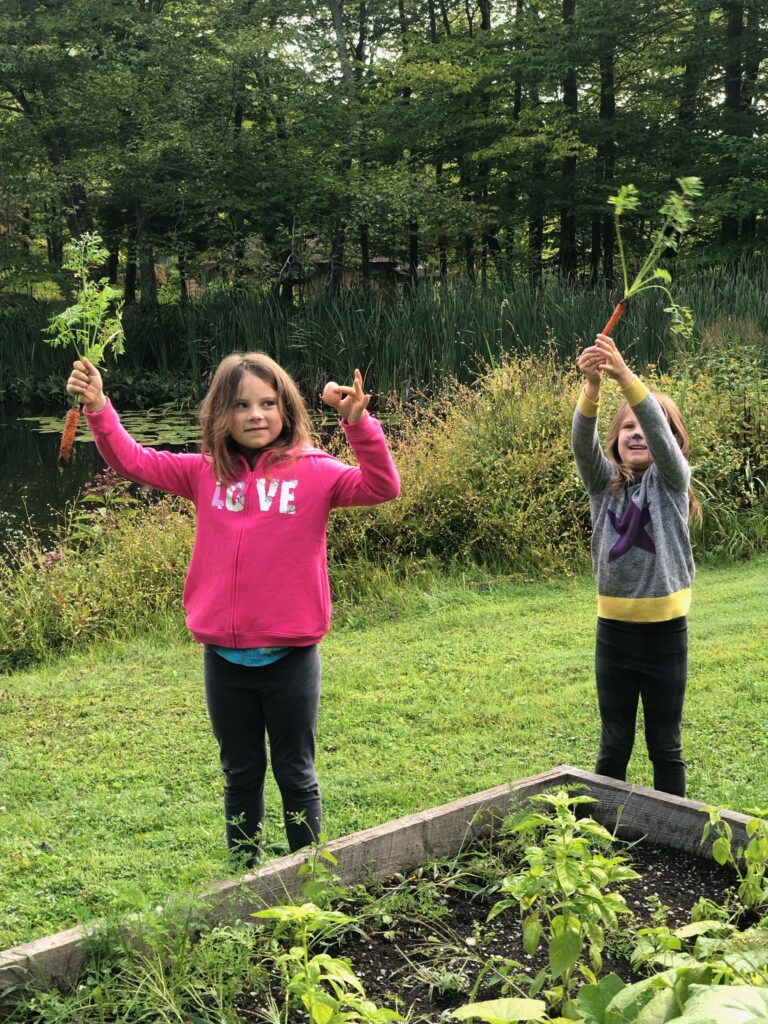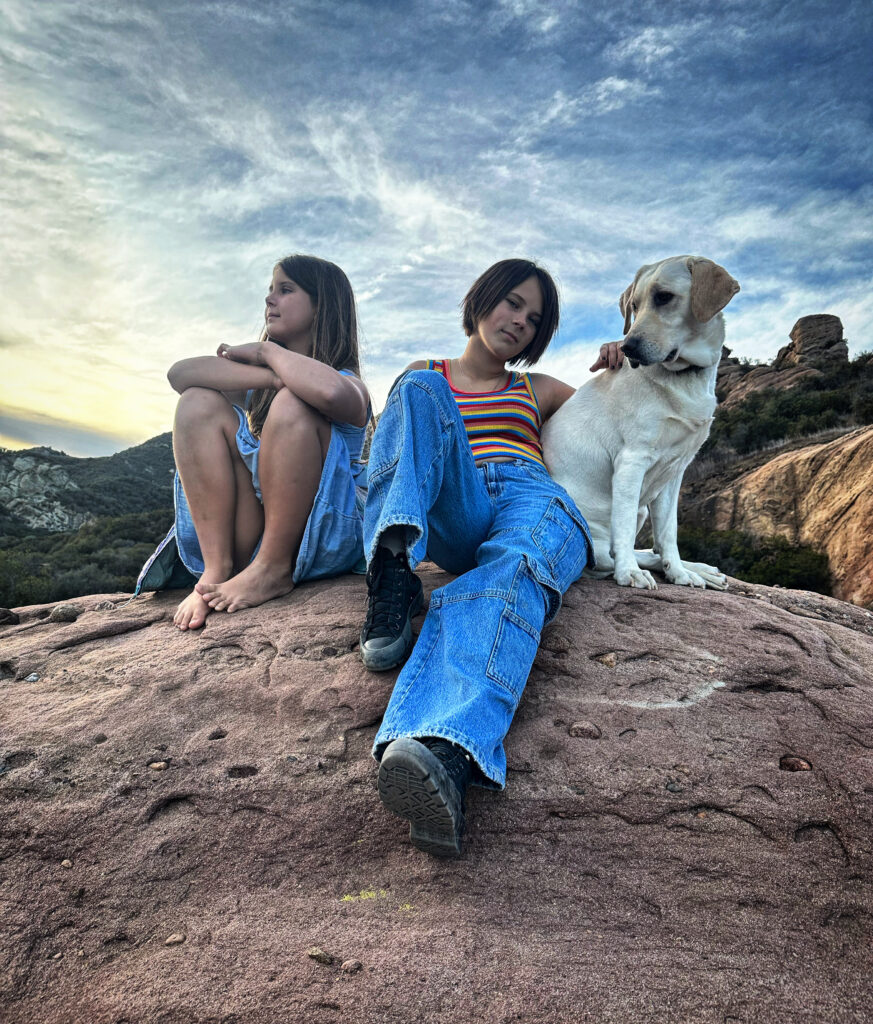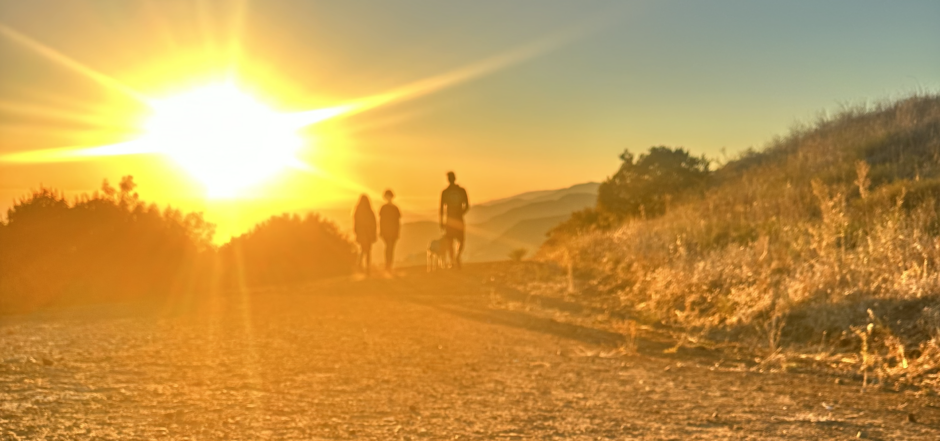A butcher, a baker, a candlestick maker…
Applying for a farm but am I a faker?
That’s a lil poem that got stuck in my head over the past few months as Collin and I have been taking steps towards potentially buying a farm in Vermont.
Truth is, I am not a farmer. When one of the only line items on my FFA application is:
Farm Experience
Please describe your training and or experience in agriculture:
Does own a pair of overalls* (*they’re shorts; does that still count?)
—it’s rather frowned upon by the agricultural powers that be.
But here’s the thing: I know I’m not a farmer. But I’m also not a faker. I’m not delusional. I mean, we *did* do some homesteading on our mountain in Vermont. Relative to everyone we know in Los Angeles, we are basically the love child of Thoreau and Laura Ingalls. But compared to our neighbors in Vermont who literally and figuratively wrote the book on homesteading (i.e., harness solar energy, live off-grid, built their house themselves, raise and grow a lot of their own food, exclusively line dry their clothes, etc) we ranked somewhere between precious and tragic…in the beginning.
When we arrived to Vermont bright-eyed and sporting slip on Vans that fateful date in November 2018, we actually camped in Fern (our trusty, yet rickety RV) on our realtor, Scott’s, land. It was extremely late when we rolled in, so we parked and went straight to sleep. We all awoke early the next morning, bleary eyed, and poured eagerly out of the RV gasping, “Look at the BEAR!! There’s a black bear in the woods!!!!”
We very quickly and abruptly nipped that enthusiasm in the bud as inconspicuously as possible when we realized that it was actually a cow. We darted back into Fern and drove to the attorney’s office to close on our new house before any potential observers could testify to our mistake.
So that’s where we started. We had a LOT to learn. Like bovines versus bears. But really, I chalk that mistake up to the extreme sleep deprivation from driving 5 days across the entire width of the United States. And maybe also to the residual effects of spending the past 3 1/2 years in LA LA Land living exclusively amongst the other lovers, dreamers, and me.
But the point is, a couple of weeks later, when I met Eric, a 70 year old Vermonter whose last name is nigh ubiquitous in the small town where we lived, he did not mistake me for a faker or a farmer. He met me mid-sled ride, screaming and laughing my lungs out with my beanie unfortunately (and thrillingly) covering my eyes as I flew down the mountain. I was piled on a sled with my two kids with my elderly Labrador barking and chasing us down the mountain. When I came to an abrupt stop (courtesy of a ditch) and uncovered my eyes, Eric was there. He said, “It’s good to hear this kind of life on the mountain again.”
I liked him straight away.
Years later, he’d admit that he “wasn’t sure we’d make it” but that “when we proved ourselves time and again,” he saw that we had what it took to live there. He said that misty-eyed as we were packing up to move back to California 4 years later.

See, Eric saw us (like in the Namaste-light-in-me-meets-the-light-in-you way, but more New England-y (like in the he-sometimes-had-a-hunting-rifle-on-the-passenger-seat way)) because he maintained the 2 mile dirt road that we lived on. So we saw him almost every, single day. We’d chat. Just about the road at first. Then as we got to know each other better, our conversation deepened. To culverts.
That word, culverts, wasn’t in my vocabulary until I met Eric. I wasn’t sure for a while that I needed or wanted it to be. But then, by the time we moved back to Los Angeles, as a sommelier is to wine, so I became to culverts. Okay, that’s total hyperbole, but I did once say after the atmospheric river of 2024 that wrecked Topanga and caused a landslide on our road, “You know why this happened?? They need better culverts.” And after 10 days of that landslide not moving an inch because everyone was busy doing a litigious stand off, I also said, “If Eric was maintaining this road, that mudslide would’ve been gone as soon as the rain stopped.”
Over the course of the 4 years we lived on our mountain, our chats with Eric were a special part of our lives. We eventually grew to talk about politics, our families, the ecosystems of the rainforest in which we lived, how he grew up much like our kids were growing up (feral in the woods), social issues, Wordle, and just about everything and anything else.
Anyway, as I was saying, we were a little out of our depth when we first arrived to Vermont, and we knew it shortly thereafter. But that’s kind of our M.O. We plunge into the deep end, struggle for a bit, then swim.
This is because Collin is highly sensitive. I’m intense. We’re both nonbinary idealist soul mates who together can accomplish what most other people think is impossible. We were also homeschooled most of our lives, so we don’t think conventionally. You know that expression, “Think outside of the box?” I’ve never found the aforementioned box. Hence the deep end life plunge MO.
For example, we were never going to be able to just take “Global Problems” as anthropology undergraduates and just talk about making change. We had to “be the change we want(ed) to see”. Some people get the inspiring bumper sticker with the quote and drive around satisfied. Some of us hinge our life choices on the meaning of the quote and set out to live that life.
In our early twenties, this made everything more complex, as it does for people who care about everything all the time. It was quite an ordeal to go grocery shopping. Even at some of the Amish stores, I’d go to pick up sugar and the ingredients list would essentially read: slavery, deforestation, cane sugar. I’d put it back down. I’d pick up bread flour and it was Con Agra brand. Ingredients read: GMOs, ruining land, destroying small farms, abusing life forms of all kinds. I’d look at the milk: existential crisis. So, Collin and I said, “Screw it. We’ll grow a garden.” And so we did.
We spent our twenties growing a garden, heating with wood, and doing our best to live well and simply (with large doses of adventure either backpacking or traveling or doing community development work). Collin was in a punk band, and I was in graduate school and working at a philosophical association. We’d pick fruit and other produce from the local orchards and farms. We lived a beautiful, simple but deep life. The goal was always to avoid becoming part of the corporate machine so that we could continue to live well with our values at the core, embodying our ideals and ultimately leaving the world a better place than we found it. We knew we had achieved a unique level of integration when the vocalist from the aforementioned punk band said (after I perfected a vegan strawberry donut for the vegans in the band); “Lindsay can bake the f*** out of anything.”
Then the recession hit. We found ourselves in a tricky financial situation with a new baby. I was bound for a fully funded doctoral program in sexual health and social justice. But that stipend ($17,000) was not going to cover our family’s needs. So we used our values decoder pin to figure out what to do next. The odd answer was to (drink more Ovaltine and also) move to Topanga, California (the green patch on the map adjacent to Los Angeles). This allowed Collin to get a job that could make what our family needed to get through the recession.
And so that’s when we entered into an era of living into each phase of life ascertaining to our best knowledge how to best move forward. It’s required a sort of dynamism and ability to read the signs of life’s current of vitality. I try to explain this to people sometimes, and the best analogy I can find is to compare it to when a bird finds an air current and just glides. I think life itself has the same type of current, and when we stay open to that current we can find ourselves gliding into the places we could not have just gotten on our own effort alone. It sounds a little woo, I know. But it’s true. True woo.
That job was soul-sucking. So that led us to Bentonville, Arkansas. As someone who grew up close to the Mason Dixon line, I was terrified of this. But we did what any progressive Yankee would do. We found an Obama sign in a yard and rented the house next to it. Our neighbors ended up being kindred spirits—an artist and a political science professor.
After almost three years there, we moved back to Topanga. We made lots of friends and lived into the kids’ little years with fellow homeschooling idealists. And then once again, we had to make a hard choice. We got priced out of Topanga, so we could have decided for me to work full time and not to homeschool anymore to prioritize staying in Topanga. But instead, our values decoder pin led us out of our beloved canyon and to Vermont to prioritize living in nature and continuing to homeschool. After our initial rookie mistakes with bovines and bears and wearing the completely inadequate footwear, we ended up finding our way. Plunge, struggle, swim. Or maybe it’s: plunge, find the current, glide.
Then, Collin had the opportunity to start this new company, Mass Culture, and so to really get the start up phase off to a great start, we moved back to Topanga. Following the life current out here was a difficult one to trust; we left our 64 acres and a beautiful life to glide toward this opportunity.
It was a risk, but it’s paid off. Through the years, while we have had to engage in capitalism, we have done so in ways that stay as true to our values as possible. Mass Culture is a B Corps which means that the ingredient list reads: fulfilled humans working well together and getting paid well. It’s been extremely successful because Collin puts his heart and soul into it.
Raising kids and homeschooling has turned out well too. Senya is super nerdy, an artistic genius, and a bad ass LGBTQIA+ rights activist. Juniper is deeply connected to nature, gifted in language arts, and is an outspoken, high-femme fashionista. Both of them are kind, creative, and funny. My homeschool approach has been like a Captain Fantastic meets The Royal Tennenbaums with a giant dose of gay pride.

Way back in 2011, we made a choice to leave home, find that current of vitality, spread our wings, and glide. Collin left his beloved simple life in the woods raising baby Senya and switched roles with me (I had been the primary income earner Senya’s first year). I declined my fully funded doctoral offer to raise our little humans. Somewhere along the way, home has become a complex concept. “Home is where the heart is” looks sweet embroidered on a tea towel, but “my heart is chopped into lots of pieces and spread all over the country so where the hell is home?” doesn’t as much.
This little air current that could potentially lead us to this farm is tricky to ascertain. I only want to spread my wings and glide in it if it’s best for everyone involved. And it’s not certain that it is, yet. There’s a very specific person in Vermont trying to decide if it is. And he’s in a bit of a pickle because to bring it back to the beginning of this little personal essay: we aren’t farmers.
So back to the question: why, if we aren’t farmers, would we buy a farm?
To make the world better than we found it. To use our resources to make a positive difference. But in order for this to actually be helpful, it’s up to the community, the land, the universe, and the agricultural powers that be. To move into a culture that is admittedly not our own (we aren’t farmers and it’s a farming community), to buy a choice piece of agriculture that we are ill-equipped to farm (think three year old with finger paints and the blank ceiling of the Sistine chapel), and to be people who are engaged in capitalist enterprise in what may be our most socialist state, it doesn’t look good at first glance.
But, then again, sometimes it takes diversity to make a situation the best that it can be. Sometimes the right person for the task at hand isn’t who you’d expect. Remember Éowyn in Lord of the Rings? Well, if not, do yourself a favor and look her up.
So Vermont, do you want some intense idealists who have made the best of their relationship with capitalism and seek to empower the people and the land? As such, we would collaborate with actual, local farmers who would farm the agricultural land associated with the farm. We’d host events in the big, old barn that would create community, raise money and awareness for social justice and environmental justice issues. Collin would continue working his magic with Mass Culture and the income from that would allow this whole operation to run. The kids would go to a progressive school which would end our era of homeschooling and thus I’d invest my days in running the homestead, the farm store, and studying herbalism. I’ll always keep writing. And of course I’d make some time to bake the f*** out of some strawberry donuts.

I love your open exploration of life. We too are making a giant leap, and I’m 60% hopeful 40% terrified. Those percentages are positive enough for me! 🙂 I wish you the best and hope to visit, and maybe even collaborate?! xoxo, C
Oh my goodness, I’m so excited for you just reading about your feeling stats and sensing that thrill of some amazing new potential in the future!! I’d love to collaborate 🙂 and yes, please visit!!!
Reading your story…i feel every step of the way with my whole heart!
I know this time of waiting for answers has been hard, and you’ll be ready to lean into the next chapter as soon as the direction is determined. I hope it’s soon!!!!
Thank you for reading, Judy! And thank you for staying close and invested in our story every step of the way 🙂 Yes, I’m really looking forward to knowing the direction soon 🙂
Your writing runs from comedy to wise admonishment. It’s always a hoot to get a glimpse into your amazing think tank.
Thanks, Dad!! I’m so glad you enjoy reading what I write! I get into flow when I write–much like how I think building your train layout was for you.
Like lava.
Love it.